New Labor Contracts Key to County Budget
Washtenaw County board of commissioners meeting (March 20, 2013): In its main action, the county board approved new long-term contracts with 15 of Washtenaw County government’s 17 bargaining units – including annual wage increases, a cap on employee healthcare contributions, and the elimination of “banked leave” days. The precedent-setting move aimed to protect unions before Michigan’s right-to-work law takes effect on March 28, and cut legacy costs for the county.
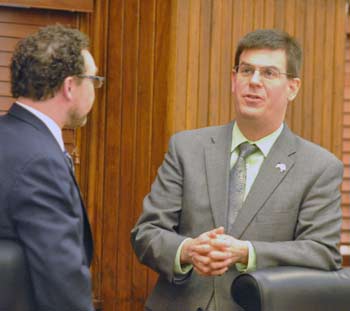
From left: Conan Smith (D-District 9) and Dan Smith (R-District 2) at the Washtenaw County board of commissioners meeting on March 20. Dan Smith cast the lone vote against new contracts with labor unions representing county employees, citing concerns over the length of the agreements. Most of the contracts run through Dec. 31, 2023. (Photos by the writer.)
About 85% of the nearly 1,300 county workers belong to a union. The board also approved similar wage and benefit changes for the county’s non-union employees.
The right-to-work law will make it illegal to require employees to support unions financially as a condition of their employment, but labor agreements in place prior to March 28 will not be affected until they expire. Most of the previous contracts with the county’s labor unions were set to expire on Dec. 31, 2013. All but one of the new deals will run for more than 10 years – through Dec. 31, 2023.
Dan Smith (R-District 2) cited the length of those contracts as a reason for casting his no vote – he was the only commissioner to vote against the union contracts, though he supported the agreement for non-union employees. The duration eliminates the flexibility to deal with different conditions that might face the county in the future, he said. There is no “re-opener” clause that would allow either side to renegotiate before 2023.
Despite his no vote, Smith praised the most significant changes that will impact employees hired after Jan. 1, 2014. Those employees will participate in a defined contribution retirement plan, instead of the current defined benefit plan – the Washtenaw County Employees’ Retirement System (WCERS). In defined benefit plans, retirees receive a set amount per month during their retirement. In defined contribution plans, employers pay a set amount into the retirement plan while a person is employed. The most common defined contribution plan is the 401(k). Similar changes in retiree healthcare plans will also affect new employees.
The shift in the county’s approach to retirement plans and retiree healthcare was a major concern for several other commissioners. While acknowledging the benefits of eliminating the county’s legacy costs, Conan Smith (D-District 9) cautioned that retirees could be put at risk without the predictable stability of a defined benefit plan. However, he also noted that the board can’t continue to put the institution at risk by “guaranteeing something that we don’t know we’re going to be able to afford in the long run.”
Those legacy costs were a factor alluded to during the March 20 discussion, linking to another major decision that is expected to come before the board: bonding to cover the county’s unfunded liabilities for employee pensions and retiree healthcare. The issue hasn’t been discussed directly at any of the board’s regular meetings, but commissioners have been informed that a proposal likely will be brought forward by administration.
Based on actuarial valuations at the end of 2011, the county had $101.27 million in unfunded liabilities for its defined benefit pension, and $148.46 million in unfunded liabilities for its retiree healthcare. Those amounts will be higher when the 2012 actuarial valuations are completed later this year. The new accounting standards of GASB 68 require that unfunded liabilities must be included in an organization’s financial statements for fiscal years beginning after June 15, 2014.
Commissioners also got a year-end 2012 financial update during the March 20 meeting – the final 2012 audit will be brought to the board in April. Total revenues exceeded total expenditures by $2.26 million. The county had planned for a surplus of $1.889 million to carry into 2013 – so the year ended with an excess of $327,607 above that targeted amount.
In other action items, the board voted to form a committee that will explore the feasibility of creating a land bank, and appointed three people to the committee: Commissioner Ronnie Peterson (D-District 6), county treasurer Catherine McClary, and Mary Jo Callan, director of the county’s office of community & economic development. The committee is directed to report back to the board by Aug. 7, 2013.
During communications from the board, Conan Smith reported that the southeast Michigan Regional Transit Authority board has now been fully appointed, and will convene on March 28 for an orientation meeting. He suggested that the two Washtenaw County representatives – Richard “Murph” Murphy and Liz Gerber – come talk to commissioners about what the county’s interests and priorities are. “The earlier we weigh in, the more systemic the impact of our comments are going to be,” he said. “If we don’t talk to them until they’ve already made decisions, then it’s going to be too late.”
Labor Agreements
The county administration and labor have been negotiating new contracts since February. At the board’s Feb. 20, 2013 meeting, commissioners had approved a resolution opposing the right-to-work legislation, with a clause that directed the county administration to renegotiate union contracts, as requested by union leaders. The resolution stated a “goal of reaching four (4) year agreements to protect and extend each bargaining unit’s union security provisions, as well as enter into a letter of understanding separate from the existing collective bargaining agreements for a period of ten (10) years.”
That was an approach taken by other institutions statewide, including the Ann Arbor Transportation Authority. [See Chronicle coverage: "AATA OKs Labor, Agency Fee Accords"] However, the county administration and union leaders ultimately felt that the strategy of a separate letter of understanding would be more vulnerable to legal challenges. They opted instead for longer-term labor agreements and no separate letter of understanding.
Since mid-February, the board has held four lengthy closed sessions to discuss labor negotiations – including a closed session near the beginning of the March 20 meeting that lasted over an hour. Labor negotiations are one of the few reasons under Michigan’s Open Meetings Act that public governing bodies are allowed to hold sessions out of public view.
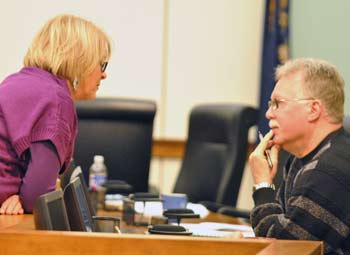
Nancy Heine, president of AFSCME Local 3052, talks with Washtenaw County commissioner Rolland Sizemore Jr. Local 3052 – which represents 48 general supervisors and four supervisors in the juvenile division – agreed to a new five-year contract.
The vote to go into closed session was 8-1, with dissent by Rolland Sizemore Jr. (D-District 5), who did not state any reason for his no vote.
The administration and AFSCME Local 2733 had reached a tentative agreement on March 7, which union members ratified on March 13. Other union bargaining units subsequently ratified similar agreements. However, the ratified agreements differed slightly from the version that had been shown to commissioners at their most recent closed session on March 6, so another closed session was held on March 20 to go over those changes.
In broad strokes, the agreements provide for annual wage increases, a cap on employee healthcare contributions, and the elimination of “banked leave” days. Banked leave days have been used in recent years to help balance the budget by cutting labor costs. The days are unpaid, but don’t affect retirement calculations.
Some of the major changes relate to benefits for employees hired after Jan. 1, 2014. Those employees will participate in a defined contribution retirement plan, instead of the current defined benefit plan – the Washtenaw County Employees’ Retirement System (WCERS). In defined benefit plans, retirees receive a set amount per month during their retirement. In defined contribution plans, employers pay a set amount into the retirement plan while a person is employed. The most common defined contribution plan is the 401(k).
In some ways, the change reverts the county to its previous approach. Until about 2009, employees participated in the Money Purchase Pension Plan (MPPP), a defined contribution plan. Most county employees were shifted from the MPPP to WCERS, the county’s defined benefit plan. The MPPP was never eliminated, but is used primarily for county commissioners who choose to participate in it.
The county will also shift away from a defined benefit retiree healthcare plan for new employees, in favor of retiree health reimbursement accounts (RHRAs).
Most details in the contracts match the agreement reached with AFSCME 2733, the county’s largest bargaining unit, with 630 members. Highlights from the AFSCME 2733 agreement include:
- Restoring 3.85% to an employee’s annual salary in 2014 by eliminating banked leave days. In addition, employees will receive a 2% non-structural salary increase.
- In 2015, there will be a 1% salary increase if county property tax revenues do not rise. However, if tax revenues do increase, employees will receive a salary increase of either 2% (if revenues increase by up to 4%) or 3% (if revenues increase by 5% or more).
- Employees will receive 2% salary increases in 2016 and 2017. The 2016 increase will be structural; the increase in 2017 will be non-structural.
- The remaining years through 2023 alternate in this same three-year pattern of (1) formula increases tied to tax revenues, followed by (2) a 2% structural increase and (3) a 2% non-structural increase.
- Current employees will remain in the county’s defined benefit retirement plan, unless they choose to transfer into a defined contribution plan.
- Employees hired after Jan. 1, 2014 will participate in a defined contribution retirement plan, with each employee providing 6% pre-tax contributions that are matched by 6% from the county. Contributions will increase to 7% in 2016 and 2017, and to 7.5% in 2018 through 2023. Vesting for employer contributions will occur over several years, with workers becoming fully vested after 10 years of employment.
- For current employees, their contributions to the Washtenaw County Employees’ Retirement System (WCERS) – the defined benefit plan – will be capped at 10% in 2014 and 2015. That cap will be lowered to 9% in 2016 and 2017, 8.5% in 2018 and 2019, and 8% in 2020 through 2023.
- The county will adopt state-mandated “hard caps” on health care contributions by public employers. Current workers will pay $75 per month in medical premium-sharing.
- Workers hired after Jan. 1, 2014 will have negotiated health care benefits. Their retirement health care will be handled through retiree health reimbursement accounts (RHRAs), with staggered contributions by the county based on years of employment. The current retiree healthcare plan – the Voluntary Employees Beneficiary Association (VEBA) – is a defined benefit plan.
At the March 20 meeting when commissioners returned from their closed session, they took up the issue of the labor agreements. Dan Smith asked to pull out the non-union agreement for a separate vote. The other six contracts were handled as a group.
The bargaining units that struck new deals are:
- AFSCME (American Federation of State, County and Municipal Employees) Local 2733 Units A, B, C, Juvenile Division, and Juvenile Detention – a total of 630 employees. [.pdf of AFSCME 2733 contract summary]
- AFSCME Local 3052 General Supervisors and Juvenile Division Supervisors – a total of 52 employees. [.pdf of AFSCME 3052 contract summary]
- Assistant Prosecutors Association Units I & II – a total of 24 employees. [.pdf of APA contract summary]
- Public Defenders Association Units I & II – a total of 13 employees. [.pdf of PDA contract summary]
- Michigan Nurses Association Units I & II – a total of 13 employees. [.pdf of MNA contract summary]
- T-POAM (Technical, Professional and Officeworkers Association of Michigan) Units I & II, District Court – a total of 30 employees. [.pdf of T-POAM contract summary]
A similar agreement was on the table for the county’s roughly 225 non-union employees. [.pdf of non-union agreement]
The resolution for non-union workers also provides the same benefits to the county’s five statutory elected officials: Treasurer (Catherine McClary), clerk/register of deeds (Larry Kestenbaum), water resources commissioner (Evan Pratt), county prosecuting attorney (Brian Mackie) and sheriff (Jerry Clayton). It also “aligns” the salaries for the treasurer and clerk/register of deeds to the current salary of the water resources commissioner – $101,685, effective immediately. Previously, the treasurer and clerk/register of deeds earned $98,570 and $101,528, respectively. The sheriff and prosecuting attorney each earn a salary of $119,268.
All of the new contracts contain only one element that takes effect in 2013: An additional banked leave day will be added, and must be used sometime this year. The intent is to ensure that the new contract differs from the previous one during the rest of 2013, to guard against possible legal challenges. If there were no changes in 2013, it could be argued that there were no real contract differences until 2014 – well after the right-to-work law went into effect.
Two bargaining units did not negotiate new contracts – the Police Officers Association of Michigan (POAM), which represents 254 employees, and Command Officers Association of Michigan (COAM), with 33 members. Those public safety employees are exempt from the right-to-work law.
For background on the county’s unions, see Chronicle coverage: “County Board Briefed on Labor Issues.” Most of the current contracts were authorized in September of 2011.
Labor Agreements: Broader Context
These new agreements will be a factor in the budget that’s being developed for 2014, 2015 and beyond. The county administration is hoping that the board will approve moving from a two-year budget cycle to a four-year budget planning process.
The administration has projected a $24.64 million general fund deficit over a four-year period from 2014 through 2017. A much smaller general fund deficit of $3.93 million is projected for 2014, but county administrator Verna McDaniel hopes to identify $6.88 million in structural changes for that year – a combination of new revenues and cuts in expenditures – in order to eliminate the cumulative deficit going forward. When McDaniel briefed commissioners on budget preparations at their Jan. 16, 2013 meeting, she indicated a desire to find $2.62 million in reductions to employee compensation and benefits.
The county also faces a challenge due to its unfunded liabilities related to employee pensions and retirement healthcare. New Governmental Accounting Standards Board (GASB) standards, enacted in 2012, require that public employee pension liabilities be reported on an organization’s balance sheet. Expenses related to pensions and retirement healthcare are projected to spike in the coming years.
Based on actuarial valuations at the end of 2011, the county had $101.27 million in unfunded liabilities for its defined benefit pension, and $148.46 million in unfunded liabilities for its retiree healthcare. Those amounts are expected to be higher when the 2012 actuarial valuations are completed later this year.
The administration plans to propose dealing with those unfunded liabilities by issuing bonds to cover those costs. Although the county would be taking on significantly more debt as a result – and incurring interest expense – the idea is to take advantage of low interest rates and create a “smoothing” of payments over a more extended period.
The board has not directly discussed this possibility at any of its public sessions. John Axe of Axe & Ecklund – a Grosse Pointe Farms firm that serves as the county’s bond counsel – has attended at least one closed session of the board this year, when labor negotiations were discussed.
In response to an email query from The Chronicle, Tina Gavalier – a financial analyst for the county – described how the new contracts and bonding could affect the upcoming budget:
The preliminary estimated cost savings from these deals in terms of the settled contracts and the anticipated bonding for retiree health care and defined benefit pension obligations is approximately $2.1M per year. The savings is likely to increase or compound over time. The estimated cost savings is preliminary because of the basis of calculations used the 2011 actuarial valuation reports. Savings estimates will be finalized after the 2012 actuarial valuation reports are published (anticipated to be in late May or early June).
If the authorization to bond is approved by the Board of Commissioners and bonding is successful, $2.1M of the $2.62M reduction target for employee compensation and benefits will have been met.
The $2.62M was based on the preliminary financial state of the county presented in January. The updated financial state of the county will be presented in May after the equalization report is issued in April. Therefore, reduction targets may be modified based on the updated financial state of the county presentation.
Labor Agreements: Board Discussion
Before the March 20 vote, Conan Smith (D-District 9) began the board discussion by saying the contracts represent “a very, very substantial change in the way the county does business.” He thought it was important for the public to know the details. In large part, the county is moving away from a defined benefit pension system and back into a defined contribution system, he noted. This introduces substantial volatility for county retirees, he said, and does not provide for predictable stability that a defined benefit plan would. He appreciated that county administration has been “keenly sensitive” to the impact of that change.
The fact is that in moving out of a defined benefit plan, C. Smith said, “we are able to eliminate substantive legacy costs for the organization, which will create an enormous opportunity for us to do alternative types of investing to the community’s benefit at large.” It comes at the cost of introducing risk into the retirement system for employees, but after weeks of heavy debate, he said, he felt the county had created the best defined contribution program that they could. “It’s not the thing that I want,” he added, saying he’d prefer that the county keep its pension plan.
C. Smith said the process of reaching this decision was “interesting, open and thorough.” For years, he said, the county’s approach to labor negotiations has been remarkable in this way. The county was one of the first local governments to institute an interest-based bargaining process, “which was revolutionary,” he said. Smith noted that when county administrator Verna McDaniel was HR director for the county, he had asked her to teach members of the Michigan Suburbs Alliance about this approach. [Smith serves as executive director for the alliance, which is based in Ferndale.] So despite the fact that he’s disappointed about moving out of the defined benefit system, Smith said he’s very supportive of the contracts because he respects the negotiating process that was used.
C. Smith said he hoped the board and administration would be attentive to retiree health care. These new contracts are moving way from a defined benefit approach to retiree healthcare, and using another kind of investment system instead. [Smith was referring to retiree health reimbursement accounts (RHRAs), for employees hired after Jan. 1, 2014.] This is probably the most important thing that the county can do financially, he noted, because they have no control over the volatility of health care costs, which have been skyrocketing. He hoped that national responses to rising health care costs will have an impact, “but we don’t know that.” So the board can’t continue to put the institution at risk by “guaranteeing something that we don’t know we’re going to be able to afford in the long run.”
The proposal to move out of guaranteed retiree health care is dramatic, C. Smith said, and will likely pose significant challenges to employees. Both administration and the board will need to be very attentive in the coming years to ensure that this new system will provide the right kind of security. He said it’s the right move fiscally for the county.
These are big changes, C. Smith concluded. He thanked other commissioners and the administration for “bearing with me through my panic modes.” He described the solution as decent. It’s “imperfect, in my opinion, but quite good – B+.”
Dan Smith (R-District 2) spoke next. As with all contracts and negotiations, you end up with things you like and things you don’t like, he said. In this case, there are some things that he liked a lot. “And then, as these things go, there are things you don’t like so much.” It’s important to look at the entire document as a whole, he said.
The thing that made D. Smith uncomfortable is that most of the contracts are long-term – more than 10 years. “That is very likely longer than the service of most of us sitting around this table,” he said. A 10-year contract “severely binds future boards and dramatically eliminates the flexibility that they have to respond to situations that may face them seven or eight years down the road.” There are some benefits to that as well, Smith noted, but he’s not able to find enough data or information that would make him comfortable with that length of time. It would be different with a two-year contract, which gives the county the chance to respond to changing conditions, he noted. With a 10-years contract and the unknowns surrounding the costs and benefits of the various provisions, “I’m just not comfortable moving forward with that at this time.”
D. Smith also cited concerns about legal questions “that continue to nip away at this.” He wished the legislature would just leave this issue alone, but instead they continue to pick at it “week after week after week.” He didn’t know how it will play out, but “I do know that if we did this contract in the traditional way … we wouldn’t have a bull’s-eye on our back for that.”
D. Smith said he wouldn’t be supporting the union contracts. He appreciated the time and effort that the administration had put in to reach these agreements so quickly. He was very pleased with some of the provisions, and looked forward to seeing how those played out. But 10 years is too long a time to risk taxpayer dollars, he said. He realized there were competing interests – taxpayers, employees, the services that the county provides to citizens – that all have different needs. He realized that the new contracts try to address those needs in various ways, but he wasn’t comfortable with it in its entirety. He concluded by thanking the administration, and saying he was sorry he couldn’t support the contracts.
Andy LaBarre (D-District 7) expressed support for the contracts. The final product included the “varied thinking on this board,” he said. Hearing some of the issues raised by Dan Smith had been “exceedingly helpful,” LaBarre said. The flip side of concerns related to the 10-year length is the stability that these contracts bring – or at least the certainty of knowing the costs and benefits, for both the county and its employees.
LaBarre said Conan Smith did a laudable job in acting as a “conscience” on the real-life impact of the county’s workforce. LaBarre also thanked commissioners Felicia Brabec (D-District 4) and Yousef Rabhi (D-District 8) for providing the framework to reach this final contract. [Rabhi serves as board chair; Brabec is chair of the board's ways & means committee.] “It’s an imperfect but very workable solution that I believe is in the long-term best interests of the county,” he concluded, “and most importantly, the long-term best interests of the citizens we serve.”
Rabhi also indicated strong support for the contracts. The process was an example of why unions have been an institution that has worked in this country, he said, and it’s an example of why Washtenaw County’s bargaining process is one to be modeled across the country. Labor and management had only a few weeks to make this happen, he said, and came together with the engagement of the board to work out these contracts. “It’s an amazing accomplishment, and one that we should all be proud of.” He agreed with Conan Smith that there were some features that “can make some of us uncomfortable.” Specifically, Rabhi cited the switch from defined benefit to defined contribution plans. But in the end, the contracts will have a significant impact on the county’s long-term fiscal stability.
The fact that it’s a 10-year contract sounds scary, Rabhi said. But it provides the stability that the county needs to move forward, and the tools to build a healthy and resilient workforce, he said. He applauded the process and all of those who were involved. It had been a challenge, and they all had stepped up to it. He agreed with Conan Smith about the need to be mindful of the long-term resiliency of county employees and fiscal strength in retirement. By helping to provide the tools that employees need to invest, the county can help employees make the right decisions about their retirement plan. That will be a priority for him moving forward.
Rabhi also highlighted the aspect of these contracts that builds in wage increases when property taxes increase. “So when the county is bringing in more money, we’re able to pay our employees more,” he said. It builds in an economic reality and stability, without ignoring the needs of employees to keep up with the cost of living. It will also allow the county to offer competitive salaries, so that they can hire and retain the most excellent staff in Michigan and the country. He concluded by again thanking everyone for their work.
Alicia Ping (R-District 3) noted that she agreed with Conan Smith that the contracts were imperfect, but “for different reasons.” Ultimately, for her it’s about the stability of the entire organization. Without that stability, no individual employee can be secure in their job. There was some give-and-take in the negotiations, and when no one is completely happy, it’s a sign that everybody truly wins, Ping said. The county can now do more structured planning, based on what they know their costs will be. And any employee who comes on board will know what their pay structure will be like, so they can do some planning, too.
The county is eliminating legacy costs by eliminating the defined benefit plan, Ping noted. For her, that’s huge – it’s one of the best things that could happen, along with the changes to retiree health care. “It also gives us options on what we can do with our unfunded liabilities,” she said.
This process got started “because Lansing is meddling again,” Ping said, and that leads to unintended consequences. The contract is lengthy, but she believed it will be an “awesome” benefit to the county. While there are certain aspects that she doesn’t agree with, overall it’s the best thing that could happen for the county and its planning efforts. She thanked both the administration and employees.
Rolland Sizemore Jr. (D-District 5) cautioned the board against using acronyms. [Some commissioners referred to defined benefit and defined contribution plans as DB and DC, for example.] Noting that the public is watching on TV, he said commissioners should use “real words” and be more down-to-earth so that people can understand what the board is saying.
Ronnie Peterson (D-District 6) told commissioners that he wouldn’t be voting on the contracts for AFSCME Local 2733 or Local 3052, citing a professional relationship he has with the union’s parent organization. [Peterson is the legislative/political director for the Michigan AFSCME area office.] He said he agreed with Conan Smith’s comments, and highlighted the “years of sacrifice” that employees have made. The new contracts are the best that the county has ever negotiated, he said. It’s a “sharing loss,” but employees again are giving up a lot to keep the organization afloat.
The employees do it because they trust the administration and board to do right by them in the years ahead, Peterson said. Employees need to get credit for their help in balancing the budget over the past few years, he said, citing furlough days, wage concessions and other “huge sacrifices.” While most employees in other organizations are now being forced to do that, Washtenaw County employees came to the table years ahead of that to keep the organization afloat and to keep jobs for their colleagues. He wanted to make sure everyone was mindful of their sacrifices, including sacrifices for future employees – some of the union membership will frown on that, he said.
The 10-year term is almost unheard of, he said. It’s not locking them into a commitment that’s too long, he added, but rather it’s locking the county into a road map for the future. If the county does well and tax revenues increase, it’s only right that the employees benefit from that, he said. “They are public service providers,” he said. “They are not public servants who serve for free. They’re entitled to their compensation.”
Kent Martinez-Kratz (D-District 1) spoke briefly, saying he supported the move to the defined contribution system. He noted that the Chelsea city council had made the same decision several years ago when he served as a councilmember. It was overdue, he said. The long-term contract will help stabilize the county, and will give the workers knowledge that their jobs will be stable. It’s a good contract, he said.
Brabec wrapped up the discussion by also expressing her support. It’s been an open and transparent process, she said, that was done with great care “under some trying and difficult circumstances.” It will allow the county to address long-term liabilities and fiscal stability, and allow for a stronger county organization and a stronger workforce to serve residents. She thanked administration and labor for their work. It’s not perfect, she concluded, “but it’s the best imperfect.”
Outcome: The vote on contracts for AFSCME Local 2733 and AFSCME Local 3052 was 7-1, with Dan Smith dissenting and Ronnie Peterson abstaining. Commissioners unanimously approved the agreement with non-union employees. The vote was 8-1 on all other union contracts, with Dan Smith casting the lone vote of dissent.
2012 Financial Update
County administrator Verna McDaniel introduced finance analyst Tina Gavalier to give commissioners a 2012 year-end report, saying “I think you’ll be pleased.” Most recently, the board had received a financial update at their Jan. 16, 2013 meeting, to lay a foundation for setting the 2013-2014 budget.
Gavalier reported that the 2012 audit is wrapping up, and will be presented to the board at its April 3 meeting. So she characterized her presentation as preliminary, with the possibility of final “tweakings” before the audit is completed.
She told commissioners that she’d start with the good news: The county saw a $540,000 surplus in property tax revenues compared to what had originally been projected in the 2012 budget. Of that, about $111,000 is due to the timing of property tax collections, including $104,000 from Ann Arbor Township’s 2011 Huron Clinton Metro Authority millage, which was collected in 2012.
Other revenue surpluses include $536,000 more than budgeted from the county clerk/register of deeds office, related to real estate transfer taxes and fees, as well as services from e-commerce. In the “transfers in” category, a surplus of $506,000 related to closing out some non-general funds, Gavalier said, and transferring those into the general fund. And a $167,000 surplus from state revenue-sharing was due to payments under the 2012 incentive program.
In total, general fund year-end revenue surpluses reached about $1.7 million.
Gavalier also noted some revenue shortfalls, including about $687,000 in the sheriff’s office mostly due to delayed implementation of the consolidated dispatch services with the city of Ann Arbor. The district court also recorded a revenue shortfall of $286,000 primarily due to lower-than-expected court fees and fines. New case filings have declined for five straight years, she noted.
Overall, general fund revenue shortfalls totaled about $973,000.
Factoring in both surpluses and shortfalls, 2012 ended with a total general fund revenue surplus of $797,970.
Shifting to the general fund expenditures, a surplus of $1.7 million in fund balance reserves was planned and will be carried forward to use in 2013. There was also a savings of $336,000 in personnel services because of attrition, job vacancies and planned reductions. An additional $309,000 in net operational savings came across all county departments. For example, the trial court exceeded its “lump sum” reduction by $101,000, not counting personnel reductions.
The category of appropriations/transfers out was $731,000 higher than budgeted. Gavalier cited an increase in infrastructure management, and capital investment in technology, building maintenance and renovations.
The total expenditure “surplus” was $1.464 million for 2012 – that is, expenditures were $1.464 million less than budgeted for the year.
Through the end of 2012, total projected revenues of $102.04 million exceed total projected expenditures of $99.78 million by $2.26 million. The county had planned for a total surplus of $1.889 million to carry into 2013 – so the year ended with a surplus of $327,607 above that targeted amount.
In 2011, the year-end fund balance was about $14.5 million, compared to a year-end fund balance as of Dec. 31, 2012 of about $16.8 million – or 16.3% of general fund expenditures in the 2013 budget.
Gavalier also reviewed several of the non-general fund outcomes for 2012. There are surpluses in the child care, facilities operations and maintenance, Friend of the Court, public/environmental health, building inspection, and risk management funds. On budget are funds for the prosecuting attorney, veterans relief, and office of community & economic development. The fund supported by the county’s Act 88 millage – for economic development and agricultural programs – showed a shortfall. Gavalier said the shortfall was planned, and includes a planned use of $15,000 from the program’s fund balance.
Looking ahead, Gavalier reminded commissioners that they’ll get the 2013 equalization report in April, along with the 2012 audit. The first-quarter 2013 budget update will be delivered in May. Throughout this year, staff will be working on the 2014-2015 budget, which will be presented to the board in September.
2012 Financial Update: Board Discussion
Yousef Rabhi wanted to highlight the shortfall of $687,000 in the sheriff’s office, most of it related to the dispatch consolidation with the city of Ann Arbor. [Rabhi represents one of three Ann Arbor districts on the county board.] It’s an example of a collaborative effort, and in the future it will save taxpayers money, he said – about $500,000 annually for Ann Arbor.
The county is working to make regional collaboration a reality, he said, “but it is costing us something.” He wanted people to realize that the county is stepping up to the plate and putting up resources to help that consolidation go forward, because they believe in this approach. He said he didn’t like the shortfall, but wanted to highlight the investment that’s being made for the sake of regionalism.
Rabhi also noted that the county has a fund balance surplus at year’s end, and that’s something to be proud and excited about. But this good news comes on the heels of federal sequestration, which will impact county operations, he said, including employees and services. The budget surplus won’t offset sequestration entirely, he said, but perhaps it helps the county delay that impact a little bit. If the board prioritizes its programs and focuses on outcomes, he added, there’s a way to mitigate the impact of a loss of federal funding.
Rolland Sizemore Jr. said he was glad the county was working with Ann Arbor on dispatch consolidation, “but maybe Ann Arbor can be a little nicer and not charge us rent.” He asked whether the county will charge Ann Arbor rent when the dispatch operation eventually moves to county facilities on Zeeb Road. [Currently, the combined dispatch unit is located in the downtown Ann Arbor fire station No. 1 across from city hall.] Greg Dill, the county’s infrastructure management director, replied that the answer was “to be determined.”
Sizemore also wondered why the county showed a deficit in Act 88 funds. Gavalier reiterated that the 2012 budget for Act 88 funds included a planned use of the Act 88 fund balance.
Conan Smith asked for more details about the appropriations/transfers out, which was $731,000 higher than budgeted. Gavalier replied that because of overall budget reductions, the county has held flat the appropriations for the “1/8th mill fund” – which is used for maintenance projects – and the technology plan. In 2012, there was some extra money available to allocate, so the administration decided to provide more funding for those areas, Gavalier said.
“How does that happen without the board voting on it?” Smith asked. Gavalier replied that it was an administrative decision. County administrator Verna McDaniel elaborated, saying those funds had been “cut short” over the past few years. The plan was to eventually restore funding, she said.
Smith noted that the board had budgeted $1.3 million for the 1/8th mill fund in 2012. So capital construction got a “solid chunk of money” in the budget process, he said. Was McDaniel saying that it was still underfunded?
Gavalier said the 1/8th mill fund and tech plan funding have been flat since 2008 and 2009. Normally, the allocations are based on property tax values, she said, but that hasn’t been the case in recent years. So administration determined that if it were possible to increase the allocation to those funds, “it would help soften that reduction,” she said.
Allowing that he might sound rude, Smith asked where the budgetary authority was to make that appropriation without the board’s approval.
McDaniel replied that she knew her authority was for line items under $100,000. The decision was made to restore funding to those areas, she said, but the board can make changes if it wants. Smith clarified with McDaniel that the funds aren’t yet spent. Gavalier added that the money has simply been transferred into the fund for future capital needs, and there was no net impact on the budget.
Smith indicated that he understood – the county had more money than it anticipated, “so we had to put it in some fund.” He further clarified that Dill would be discussing how those funds would be used during a working session presentation on March 21. [Dill's recommendations, presented on March 21 as part of the county's "space plan," included demolishing the former juvenile center and redeveloping the vacant Platt Road site, as well as renovating and remodeling several other county facilities.]
Smith said he wanted to draw the board’s attention to the fact that the money in this line item hasn’t yet been spent. The board has discussed other priorities for the organization, he added, and they need to carefully weigh the appropriateness of making an investment in the county physical infrastructure against some of the programmatic cuts that have been made – such as support for nonprofits, or to offset the impact of sequestration.
Andy LaBarre, who chairs the board’s working sessions, noted that in addition to the space plan update, the March 21 working session would include a presentation by Mary Jo Callan, director of the county’s office of community & economic development, about the impact of sequestration. [.pdf of sequestration impact on county departments] [.pdf of sequestration impact on OCED programs]
Outcome: This was not a voting item.
County Land Bank
Commissioners were asked to form a committee that will explore the feasibility of creating a land bank. A resolution on the March 20 agenda also named three people to the committee: Commissioner Ronnie Peterson (D-District 6), county treasurer Catherine McClary, and Mary Jo Callan, director of the county’s office of community & economic development. The committee is directed to report back to the board by Aug. 7, 2013.
A land bank is a mechanism for the county to take temporary ownership of tax- or mortgage-foreclosed land while working to put it back into productive use. “Productive use” could mean several things – such as selling it to a nonprofit like Habitat for Humanity to rehab, or demolishing a blighted structure and turning the land into a community garden.
The board has made attempts in the past to start a land bank, and actually formed one in the summer of 2009. But after commissioners were unable to resolve issues related to governance and funding, they voted to dissolve the land bank in March of 2010. Only three current commissioners were on the board at that time: Ronnie Peterson, Rolland Sizemore Jr. and Conan Smith.
At its Sept. 1, 2010 meeting, the board voted to revive the land bank. However, the board never took the next step of funding it or getting approval from the state.
On March 20 it was current board chair Yousef Rabhi who brought forward the land bank resolution. At the board’s Feb. 20, 2013 meeting, Rabhi had announced his interest in this effort.
For additional background, see Chronicle coverage: “Banking on a Land Bank” (July 8, 2009 board meeting); and discussions during the county board meetings on March 17, 2010, July 7, 2010 and Aug. 4, 2010.
Outcome: Without discussion, commissioners voted to form the land bank exploratory committee.
New Jobs in Water Resources, IT
Two new jobs – in IT support and water resources – were on the March 20 agenda for initial approval.
A new water resource specialist will work in the county’s office of the water resources commissioner, Evan Pratt. The job is authorized at a salary range between $30,515 to $40,253. According to a staff memo, the position is needed due to heavy drain construction activity and an increase in soil erosion application inspections. The job is described as a revenue-generating position, bringing in an estimated additional $41,337 in each of the first three years, and a minimum of $15,000 annually after that. The staff memo indicates that the office has identified reductions within its budget to offset the increased cost of the position.
New Jobs in Water Resources, IT: Board Discussion
Commissioner Dan Smith (R-District 2) expressed hesitation to add to the county’s payroll, but said he understood the need in these cases.
Evan Pratt, the county’s water resources commissioner, attended the March 20 meeting and spoke briefly, beginning his remarks by joking: “Long-time listener, first-time caller.” [He was first elected to this position in November of 2012.] Pratt said the construction activity is primarily in the city of Ann Arbor, which is paying for the work and has made at least a three-year commitment. “Existing staff was doing the work, but getting pretty far behind,” he said. He added that he had challenged his staff to figure out a cost-effective way to handle this without hiring part-time staff. The strategy includes shifting some clerical and accounting work to existing front-office staff.
Yousef Rabhi (D-District 8) said he appreciated that Pratt would be hiring a full-time position, rather than using temporary or part-time workers.
Pratt said he wished he didn’t have to come before the board with this request while they were dealing with labor negotiations, and he didn’t want people in the public to think the county was sending a mixed message. Pratt indicated that he was sensitive to Dan Smith’s concerns, but thought this was the most cost-effective way to proceed, by shifting some responsibilities elsewhere within his office. “We see it as budget neutral,” Pratt said.
The IT system support technician was authorized at a salary range between $37,464 to $52,355. According to a staff memo, the new position is needed to provide back-up for the IT help desk and other staff support. It will be funded from IT contracts and a structural reduction of $32,647 in the tech plan appropriation.
Outcome: Both positions received unanimous approval from commissioners in an initial vote at the ways & means committee meeting. The items will be considered for a final vote on April 3.
Public Health Plan
The Washtenaw County public health plan – mandated by the state of Michigan – was on the agenda for a final vote. The board gave initial approval at its meeting on March 6, 2013. [.pdf plan of organization]
State law requires that the county submit a plan of organization every three years to the Michigan Dept. of Public Health. The 103-page document outlines the county health department’s legal responsibilities and authority; the department’s organization, vision, mission and values statement; community partnerships; services, locations and hours of operation; reporting and evaluation procedures; and procedures for approving the county’s health officer and medical director. In Washtenaw County, the health officer is Dick Fleece. Alice Penrose serves as medical director.
Approval of the health plan is part of the state’s accreditation process for public health departments, which was put in place in 2004.
There was no discussion on this item.
Outcome: Commissioners unanimously approved the county’s public health plan.
Water Quality Training Fee
A $75 fee for Washtenaw County’s training course to certify drinking water operators was on the agenda for final approval. The board had given initial approval at its meeting on March 6, 2013.
Entities with drinking water supplies or places that use certain water treatment processes – like factories or schools – are required by the state to have certified operators. Until the end of 2013, the Michigan Dept. of Environmental Quality (MDEQ) reimbursed local health departments that offered these training courses, paying $75 for each certified operator who attended. Those funds will no longer be provided. The Washtenaw County public health department plans to continue offering the courses, but now needs to charge for this service.
The new fee will take effect on April 1, 2013.
Outcome: With no discussion, commissioners gave final approval to set the training course fee at $75.
Communications & Commentary
During the evening there were multiple opportunities for communications from the administration and commissioners, as well as public commentary. Here are some highlights.
Communications & Commentary: Regional Transit Authority
Conan Smith (D-District 9) highlighted the fact that the southeast Michigan Regional Transit Authority board has now been fully appointed, and will convene on March 28 for an orientation meeting. He suggested that the two Washtenaw County representatives – Richard “Murph” Murphy and Liz Gerber – come talk to the board about what the county’s interests and priorities are. “The earlier we weigh in, the more systemic the impact of our comments are going to be,” he said. “If we don’t talk to them until they’ve already made decisions, then it’s going to be too late.”

The city of Detroit and counties of Wayne, Macomb, Oakland and Washtenaw are included in a regional transit authority created by state legislation passed on Dec. 6, 2012.
Rolland Sizemore Jr. (D-District 5) said he’s been getting emails from people in the community who are interested in opting out of the RTA. He wanted to have a working session soon to talk about the RTA, “before we get too far down the tubes, to find out what our options are.”
Smith responded, saying there are no opt-outs allowed for the RTA under state statute. He thought Sizemore might be talking about the countywide effort that “AATA and the locals were trying to put together.” As far as the RTA, legally no one can opt out, he said. Sizemore replied that he still wanted a working session on it.
By way of background, the RTA was created by the legislature in December of 2012 to coordinate regional transit in the city of Detroit and counties of Wayne, Macomb, Oakland and Washtenaw. Conan Smith has been a strong advocate for Washtenaw County’s participation in the RTA. He lobbied the legislature to include Washtenaw County in the RTA, and accelerated the appointment process so that he could make the county’s two appointments to the RTA board before his term as board chair expired at the end of 2012.
However, other local leaders are concerned about the impact of the RTA on the Ann Arbor Transportation Authority, which primarily serves Ann Arbor and Ypsilanti. At a special meeting on Dec. 10, 2012, the Ann Arbor city council unanimously passed a resolution objecting to the inclusion of Washtenaw County in the RTA. There was subsequent lobbying to urge legislators to amend the law so that Washtenaw County would be excluded from the RTA – but that hasn’t happened.
Separately, the AATA has been meeting with representatives of the county’s “urban core” communities to discuss possible expanded public transit within a limited area around Ann Arbor. This follows last year’s derailed effort to build a countywide transit system. The AATA is hosting a meeting on March 28 to go over details about where improvements or expansion might occur, and how much it might cost. [See Chronicle coverage: "Costs, Services Floated for Urban Core Transit."]
Communications & Commentary: Healthy County
Alicia Ping noted that Washtenaw County has been ranked among the healthiest counties in the state. She congratulated the staff for their work.
The annual rankings are published by the University of Wisconsin Population Health Institute and the Robert Wood Johnson Foundation, looking at counties across the U.S. Dick Fleece, Washtenaw County’s public health officer, told commissioners that there are two categories: (1) health outcomes, based on morbidity and mortality; and (2) health factors, including health behaviors (tobacco use, diet and exercise, alcohol use and sexual activity), access to care and quality of care, social and environmental factors, and physical environment.
Washtenaw County ranked first in Michigan for health factors, Fleece reported, and fifth for health outcomes.
Communications & Commentary: Thomas Partridge
Only one person spoke during public commentary at the meeting. Thomas Partridge told commissioners that it was nearly the eve of Good Friday and Easter, and he wondered what Jesus would advocate if he were here today. Partridge thought Jesus would want everyone to be treated in a kind, respectful manner – despite differences of opinion. Commissioners need to work toward affordable, accessible housing and transportation, among other issues to help the most vulnerable residents of Washtenaw County.
Present: Felicia Brabec, Andy LaBarre, Kent Martinez-Kratz, Ronnie Peterson, Alicia Ping, Yousef Rabhi, Rolland Sizemore Jr., Conan Smith, Dan Smith.
Next regular board meeting: Wednesday, April 3, 2013 at 6:30 p.m. at the county administration building, 220 N. Main St. in Ann Arbor. The ways & means committee meets first, followed immediately by the regular board meeting. [Check Chronicle event listings to confirm date.] (Though the agenda states that the regular board meeting begins at 6:45 p.m., it usually starts much later – times vary depending on what’s on the agenda.) Public commentary is held at the beginning of each meeting, and no advance sign-up is required.
The Chronicle could not survive without regular voluntary subscriptions to support our coverage of public bodies like the Washtenaw County board of commissioners. Click this link for details: Subscribe to The Chronicle. And if you’re already supporting us, please encourage your friends, neighbors and colleagues to help support The Chronicle, too!





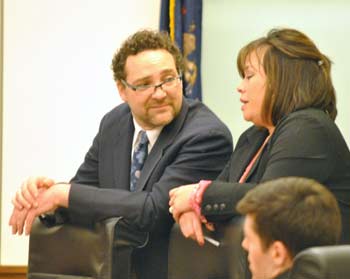
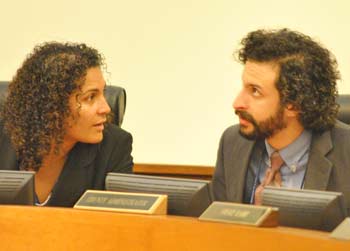
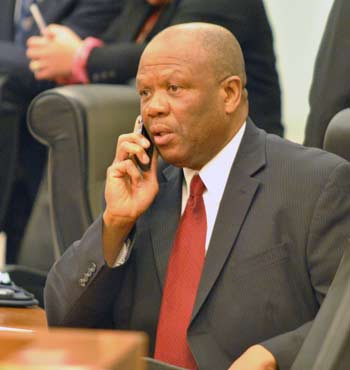

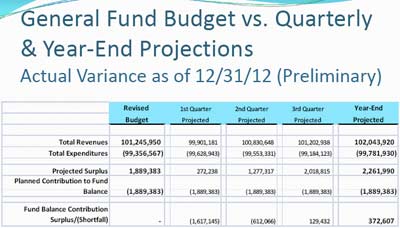
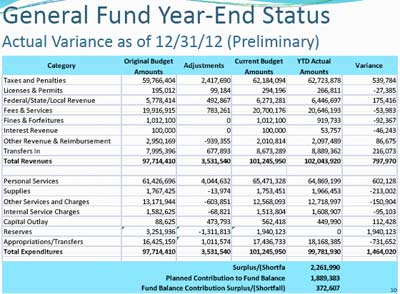
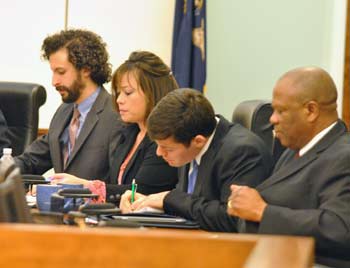
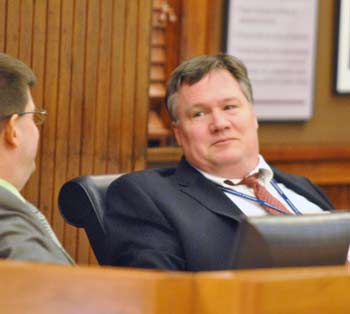
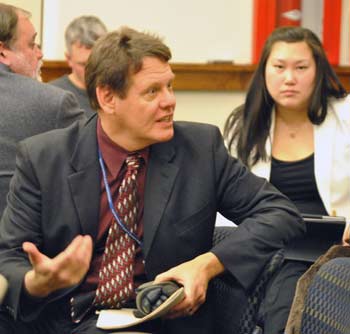
Among the bushels of verbiage is something about a forthcoming proposal for bonding to cover unfunded pension and retiree health care, possibly to the tune of a quarter billion, which is simple English means a big millage increase for a long time.
Very probably AAPS and the City of Ann Arbor will be doing the same thing. State taxes will probably go up substantially now that Michigan is the proud new owner of Detroit. Federal tax increases appear to be inevitable, the only questions being how much and when.
The local electorate will not have much influence on State and Federal matters but can politely (or not so politely) decline millages. The county government has made pension and retiree health care promises that are way beyond its resources. The unions will not accept concessions of more than cigarette money. The obvious way out of this is not increased taxes but bankruptcy. Send a legal observer to Detroit, see how it is done, get the paper work ready, it will be needed.
The passage to which Herb is alluding is this one:
Commissioner Ronnie Peterson, legislative/political director for the Michigan AFSCME area office: It is a ‘tremendous sacrifice’ when the foxes in the henhouse don’t eat every last chicken.
The Washtenaw County Board of Commissioners have unwisely and financially irreponsibly given unionized government workers premium way-out-of-line pension and healthcare benefits and they now have a huge unfunded liability problem for these gold-plated programs which they hope to fix by floating $250 million bond issue. That means millages and taxes will have to rise substantially. This County Board has done a shameful job of managing Washtenaw County government. They manage for politically friendly special interests and against the interests of taxpayers and the general public.
But our county’s sainted CEO Verna, bless her public service minded soul, she won’t be eligible to collect just voted unfunded pension funds and gold plated lifetime health care benefits that regular taxpayers pay for but can never receive … am I right?
I agree with comment 1 but perhaps “cigarette money” is not such a good metaphor these days, do you know what smokes cost these days Herb? I smoke two packs of Camels a day, my wife one of Virginia Slims, the children and their friends filtch constantly (we pretend not to notice). In this house at least cigarette money is not cigarette money.